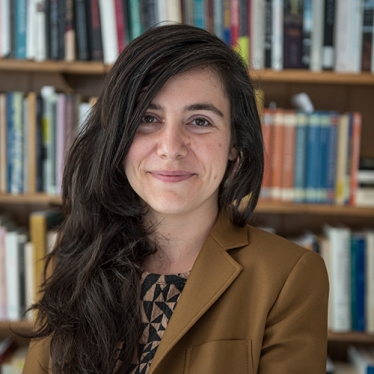Lily Gurton-Wachter
Associate Professor of English Language & Literature

Contact & Office Hours
Spring 2023
Wednesday 1-3, and by appointment.
Seelye Hall 402
Education
Ph.D., University of California, Berkeley
B.A., Bard College
Biography
Lily Gurton-Wachter received her bachelor’s in literature from Bard College and her doctorate in comparative literature from the University of California, Berkeley. Her dissertation was awarded the American Comparative Literature Association’s Charles Bernheimer Prize for the best dissertation in the field of comparative literature for 2011. Her teaching and research focus on Romanticism, comparative poetics, contemporary poetry, literature and politics, and the history of feeling. In addition to teaching a variety of Romantic-era authors and texts—including courses on Austen, Blake, Frankenstein: The Making of a Monster, and The Pleasures of Not Thinking: Romanticism and the Irrational—she teaches The Lives of Animals: Literature and the Nonhuman, Environmental Poetry and Ecological Thought, Monstrous Mothers, and Hybrid Genres: Experiments in Literary Form. Before joining the Smith English department, she taught at Bard College, the Prison University Project at San Quentin Prison, the University of California, Berkeley, and the University of Missouri.
Gurton-Wachter’s first book, Watchwords: Romanticism and the Poetics of Attention, argues that the concept of attention became particularly unhinged at the turn of the 19th century in Britain, oscillating between disciplines—from theology to pedagogy, from philosophy to science, and, most forcefully, from poetics to the rhetoric and practices of war. Through close readings of poetry by Blake, Coleridge, Cowper, Keats, Charlotte Smith and Wordsworth, Watchwords uncovers a strain of poetics especially concerned with the militarization of attention, a poetics that defines itself and its reader’s attention as a resistance to, and reconfiguration of, wartime vigilance. This new framework for interpreting Romanticism reveals what turns out to be an ongoing tradition of war literature that, rather than giving testimony or representing warfare, uses rhythm and verse to experiment with how and what we attend to during war.
Gurton-Wachter’s current book project, Countersentimental Poetics and Other Abolitionisms, tracks a countersentimental impulse across poems that interrupt and refuse familiar strategies for eliciting sympathy or pity, texts that protest violence and injustice not by seeking to garner sympathy, but rather by throwing a wrench in the sympathetic exchange. Searching for the overlooked strands of a counterintuitive protest poetry, the book tries to disentangle abolitionism from the regulation of feeling, and finds alternatives in the poetics of opacity, parataxis, and disproportion.
Selected Publications
Books
Watchwords: Romanticism and the Poetics of Attention. Stanford University Press, 2016.
Articles
“War.” Oxford Handbook of Romantic Prose. Forthcoming.
“Reading by Firefly.” Studies in Romanticism, Spring 2023.
“Introduction” to Romantic Circles Issue on “Romantic Poetics of Public Feeling,” co-written and co-edited with Tristram Wolff, 2021.
“Blake’s ‘Little Black Thing’: Race, Injury, and the Politics of Joy.” ELH, 2020.
“Blake’s Blush: Wartime Shame in “London” and Jerusalem,” in Blake: Modernity and Disaster. University of Toronto Press, 2020.
“Sympathy Between Disciplines.” Literature Compass. February 2018.
“’Ever on the Watch’: Wordsworth’s Attention.” Studies in Romanticism. Winter 2013.
“‘An Enemy, I suppose, that Nature Has Made’: Charlotte Smith and the Natural Enemy.” European Romantic Review. Spring 2009.
Public Writing
“Afterword” to Supervision: On Motherhood and Surveillance. MIT Press, 2023.
“Undefined.” Poetry Foundation website, November 2018.
“The Stranger Guest: The Literature of New Motherhood.” Los Angeles Review of Books, July 2016.
